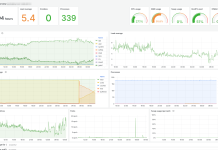Source is Amazon Business Productivity
Companies often license and manage dozens of software-as-a-service (SaaS) applications, with some deploying more than 100 applications annually, for communications, finance, content management, and customer relations. While their hope is that these purpose-built applications make employees more productive, the applications rarely work well together, creating security and productivity challenges.
At AWS, we’ve seen a fundamental shift in the applications space over the last several years. IT departments used to control the application stack centrally, allowing them to strictly govern application access and data storage. They usually chose to do that with monolithic suites that provided a broad range of functionality. But with the emergence of SaaS, many of those applications decisions have shifted to line-of-business owners outside of IT. For many of those applications, there’s not significant technical expertise needed to implement them, and a lot of them you can start using immediately with just a credit card. An entire industry of new purpose-built applications emerged that helped particular users do their jobs better.
The rise of SaaS application adoption also introduced two distinct challenges. First, the increased adoption of SaaS applications outside of normal IT processes puts pressure on system administrators and security analysts to quickly figure out how to support them. They’re charged with ensuring that corporate data remains secure inside and outside the organization, and as much as end users love those purpose-built applications, IT is less enamored with them. They have to figure out how to manage a large number of applications with different interfaces, separate APIs, and disparate log formats. Each application can take weeks or months of work to properly integrate it into a security tool for proper oversight.
Second, employees find themselves in a state of technology overload. Technology overload occurs when you’re drowning in too many technologies, notifications, and nearly continuous digital distractions. The result is siloed data across tools, and distributed teams struggling to efficiently coordinate work across fragmented systems hinder enterprise-wide coordination.
The root cause is uncoordinated SaaS sprawl. Employees are overwhelmed by fragmented tools, but lack unified guidance on streamlining their technology stack. In fact, our customers told us that they use so many different tools today that it is sometimes hard to know how to use each tool most effectively. As discussed with Dr. Rebecca Hinds, head of Asana’s Work Innovation Lab, that hesitancy is a breeding ground for technology overload. Employees use so many tools to collaborate, they’re becoming overwhelmed and exhausted, instead of productive and energized.
We built AWS AppFabric to solve for challenges facing IT and end users today. AppFabric is a no-code service to connect multiple SaaS applications together for better security, management, and productivity. It empowers deliberate, needs-based SaaS adoption while removing the fragmentation hampering productivity. Integration is handled automatically so enterprises can use the right tools for their business without any custom work.
Read our full study conducted with AWS Partner, Asana, in the Harvard Business Review that shows why typical workers feel overwhelmed by their collaboration tools, yet are helpless to simplify their technology stack. Our findings recommend that thoughtful guidance on SaaS management and digital transformation must come from the top.
With AppFabric, we are empowering companies to be deliberate and intentionally about introducing new tools, and creating a culture of “yes” from IT and security teams when departments adopt purpose-built SaaS applications for their employees. Try AppFabric today and use the right set of tools that work together to support your business critical needs. Learn more about AppFabric today by visiting our webpage, aws.amazon.com/appfabric.















